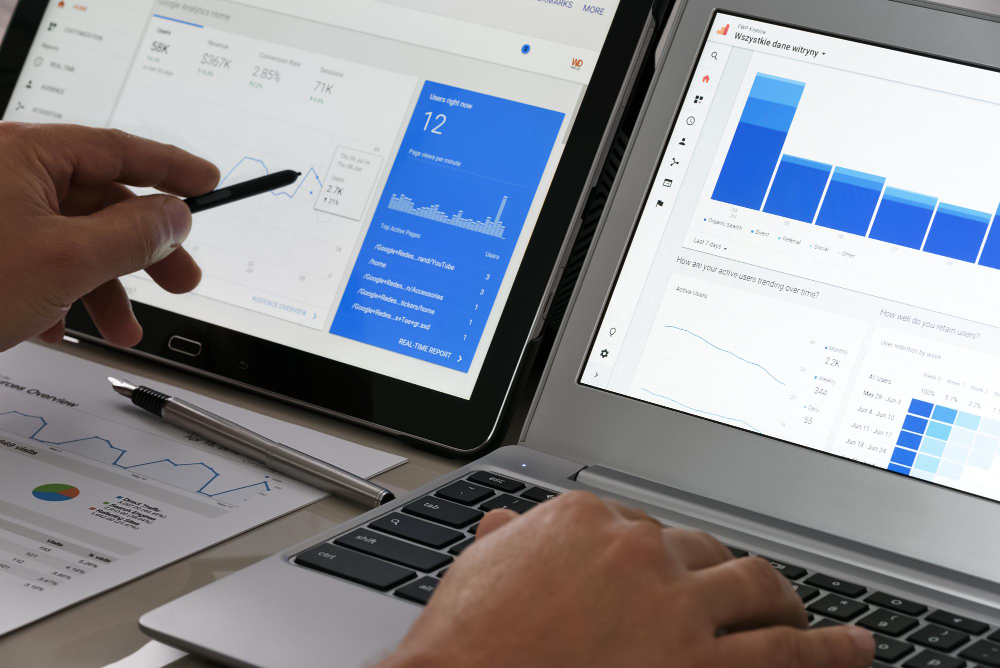In today's fast-paced digital landscape, maintaining a standout online presence is more crucial than ever. But how can you ensure your website stays up-to-date, secure, and user-friendly? Enter website maintenance services. In this blog post, we'll delve into the world of website maintenance, exploring its importance, key tasks, factors affecting costs, and how to develop a comprehensive maintenance plan. So buckle up and get ready to turbocharge your website's performance!
Short Summary
- Website maintenance services are essential for providing improved user experience, higher search engine rankings, and better WordPress security.
- Regular website maintenance tasks such as security measures, content updates, and SEO optimization should be performed to keep a website up-to-date.
- Developing an effective website maintenance plan requires task identification & scheduling. Monitoring & reporting. Plus utilizing the right tools & resources for efficient upkeep.
Understanding Website Maintenance Services

Website maintenance services are the unsung heroes of successful online businesses. They work tirelessly to keep websites running smoothly, up-to-date, and secure. By tackling a variety of tasks, such as fixing broken links, optimizing site performance, and updating content, these services ensure that your website remains a powerful marketing tool.
But why should you invest in regular website maintenance? For starters, maintaining your website can result in improved user experience, higher search engine rankings, and better security. With a maintenance plan in place, you'll be able to attract and retain potential customers while also keeping your site safe from cyber threats.
The Role of Website Maintenance Services
Website maintenance services play a vital role in ensuring that your site remains functional, user-friendly, and secure. These services tackle a wide array of tasks, such as evaluating website speed, executing security assessments, analyzing website analytics, revising outdated blogs, enhancing your website's visual branding, and integrating new systems and updates.
One of the most significant aspects of website maintenance services is enhancing user experience. By implementing effective web design, swift processing speed, and preventing broken links, these services guarantee that your site remains accessible and enjoyable for all users.
Benefits of Regular Website Maintenance
Regular website maintenance offers a plethora of advantages. By keeping your site up-to-date and secure, you'll be able to deliver a top-notch user experience for your visitors. Moreover, well-maintained websites are more likely to rank higher on search engines like Google, increasing visibility and attracting more traffic.
SEO plays a crucial role in website maintenance. By optimizing your site for search engines, you can ensure that your website remains visible and relevant to your target audience. Regular maintenance helps address technical issues, security vulnerabilities, and outdated content that could negatively impact your search engine rankings.
Key Website Maintenance Tasks to Keep Your Site Up-to-Date

To keep your website in tip-top shape, there are several key maintenance tasks that you should prioritize. These tasks include ensuring robust security measures, updating content and optimizing SEO, and enhancing your site's overall performance.
It's crucial to stay proactive with your website maintenance. By regularly performing these tasks, you can mitigate potential risks, such as server crashes or hacks, that may lead to a complete website failure. Additionally, staying on top of maintenance allows you to consistently provide fresh, relevant content for your visitors, ensuring a positive user experience.
Security Measures
Security is of paramount importance when it comes to website maintenance. By taking the necessary precautions, you can protect customer data and prevent potential hacking attempts. Regular automatic or manual backups, uptime monitoring, and security scanning are all essential tools in your security arsenal.
In addition to these measures, it's crucial to stay up-to-date with security updates or patches released by web development companies. By addressing potential vulnerabilities in their software, these updates help maintain a secure and functional website.
Implementing a comprehensive security strategy will not only safeguard your site but also enhance user experience and ensure uninterrupted uptime.
Content Updates and SEO
Content updates and SEO play a significant role in website maintenance. Staying current with industry changes and trends is essential for providing engaging and relevant content for your visitors. Additionally, optimizing your website for search engines can help identify and address issues that may be impacting your site's ranking.
Various tools and resources are available to streamline the content update process, such as WP Engines' Smart Plugin Manager, which automatically detects and updates plugins. For SEO monitoring, an array of free and paid tools can be utilized to track your website's ranking, backlinks, and traffic.
By regularly updating content and monitoring SEO, you can ensure that your website remains a powerful asset in your digital marketing strategy.
Performance Optimization
Performance optimization is another crucial aspect of website maintenance. By enhancing your website's speed and functionality, you can provide a seamless user experience for your visitors. Tools such as Google Pagespeed Insights or Yahoo's YSlow can help you identify factors that may be affecting your site's performance, allowing you to make the necessary adjustments.
Assessing website accessibility is also an important part of performance optimization. By ensuring that your site is accessible to all users, including those with disabilities, slow internet connections, or using mobile devices, you can create an inclusive online experience.
Regular monitoring of website uptime and utilizing various performance optimization tools can help you maintain a fast, functional, and accessible website.
Factors Affecting Website Maintenance Costs

Website maintenance costs can vary greatly depending on several factors, such as the size and complexity of your website, the frequency of updates, and customization requirements. By understanding these factors, you can budget accordingly and ensure that your website receives the maintenance it needs to thrive.
Some additional expenses associated with website maintenance include domain name renewal fees, web hosting plan rates, SSL license charges, email accounts, specialized technical support, eCommerce services, website design, plugins, and search engine optimization. By considering these costs, you can develop a comprehensive maintenance plan that aligns with your budget and goals.
Size and Complexity
The size and complexity of your website can greatly impact your maintenance costs. Larger and more intricate websites may require more frequent updates and maintenance, leading to higher costs. Furthermore, more complex websites may necessitate specialized expertise to maintain, which can also affect the overall cost.
For instance, self-hosting a small personal blog typically comes with relatively low costs, primarily consisting of domain name renewal and hosting service fees. By understanding the relationship between size, complexity, and maintenance costs, you can make informed decisions about your website maintenance budget.
Frequency of Updates
The frequency of updates can also affect your website maintenance costs. Websites requiring more frequent updates, such as blogs or news websites, will generally have higher maintenance costs than those updated less often. However, the exact impact may depend on other factors, such as the size and functionalities of your website.
When determining the frequency of updates, consider the needs of your website and its users. For example, a blog or news website may need more frequent updates than a site with static content. Additionally, consider the amount of traffic your website receives and the degree of customization needed to ensure that your maintenance plan meets the needs of your site and its users.
Customization Requirements

Customization requirements can also influence website maintenance costs. For example, eCommerce sites that require additional tools to operate an online business might have higher maintenance costs. Assessing your website's specific needs and customization requirements can help you plan your maintenance budget accordingly.
To minimize maintenance costs, consider regularly optimizing your website database and removing duplicate files, unused media files, and outdated pages. By taking these proactive measures, you can keep maintenance costs in check while still maintaining a high-quality website.
Developing a Comprehensive Website Maintenance Plan

Developing a comprehensive website maintenance plan is essential for keeping your site in peak condition. A well-crafted plan should include identifying necessary maintenance tasks, scheduling regular maintenance, and monitoring and reporting on the progress of those tasks. By creating a maintenance plan, you can ensure that your website stays up-to-date, secure, and user-friendly.
Having a maintenance plan in place can also help you budget for website maintenance costs more effectively. By understanding the factors that affect maintenance costs and the specific needs of your website, you can create a plan that aligns with your budget and goals.
Identifying Maintenance Tasks
To create an effective maintenance plan, start by identifying the tasks necessary to maintain and enhance your website. Regular tasks might include backups, fixing broken links, auditing user access, updating software, uploading new content, and monitoring website metrics. Performing these tasks regularly can help ensure the security, up-to-date content, and optimal performance of your website.
When prioritizing maintenance tasks, consider the importance of each task, the time and resources needed for completion, the potential consequences of not completing the task, and the potential rewards of completing it. By carefully assessing and prioritizing tasks, you can create a maintenance plan that effectively addresses the needs of your website and its users.
Scheduling Regular Maintenance
Scheduling regular maintenance is a key component of a comprehensive maintenance plan. Aim to perform maintenance during periods of low traffic to minimize disruptions to your users. Additionally, be sure to create backups of your site before performing any updates to protect against potential issues.
By scheduling maintenance at regular intervals, you can proactively address potential issues before they become big problems. This not only helps to keep your website running smoothly but also ensures that you can consistently provide fresh, relevant content for your visitors.
Monitoring and Reporting
Monitoring and reporting are essential aspects of website maintenance. Tracking the progress of your maintenance plan and identifying areas that need improvement can help you ensure that your website is meeting its goals. Regular monitoring can also help you identify potential security vulnerabilities, allowing you to address them before they cause harm.
Generating a website maintenance report can also be beneficial. These reports can help you track how maintenance activities have influenced site performance, such as increased speed, strengthened security, or improved rankings. With regular reporting, you can make data-driven decisions about updates and improvements to your website.
Tools and Resources for Efficient Website Maintenance

There are various tools and resources available to help you maintain your website efficiently. These include security tools for protecting against threats, performance optimization tools for enhancing site speed and functionality, and SEO and analytics tools for monitoring and improving your site's visibility. By leveraging these tools, you can ensure that your website continues to serve as a powerful marketing tool for your business.
Whether you're a small business owner or managing a large corporate site, having the right tools and resources at your disposal can make all the difference in maintaining an effective and efficient website. By staying up-to-date with the latest tools and trends, you can keep your site secure, user-friendly, and optimized for success.
Security Tools
Security tools are essential for maintaining a safe and secure website. These tools, such as Sucuri, Cloudflare, and Detectify, can help you detect and eliminate malware, identify and resolve security vulnerabilities, and even provide web application firewall services. By implementing these tools, you can protect your site from potential threats and ensure a secure browsing experience for your users.
Whether you're using malware scanning tools or vulnerability scanning tools, security tools can greatly enhance the overall security of your website. By staying vigilant and implementing the appropriate tools, you can safeguard your site and maintain the trust of your users.
Performance Optimization Tools
Performance optimization tools, such as Google Pagespeed Insights or GTmetrix, can help you identify areas of improvement in your site's speed and functionality. By addressing these issues, you can ensure a smooth and enjoyable browsing experience for your users, which in turn can lead to increased engagement and conversions.
In addition to these tools, it's important to regularly assess your website's accessibility. Ensuring that your site is accessible to all users, including those with disabilities or slow internet connections, can help create an inclusive online experience.
By using performance optimization tools and regularly evaluating your site's accessibility, you can maintain a high-performing and user-friendly website.
SEO and Analytics Tools
SEO and analytics tools, such as Google Analytics and Semrush, can provide invaluable insights into your website's performance and visibility. These tools can help you track website traffic, user engagement, and other key metrics, allowing you to make data-driven decisions about updates and improvements.
By utilizing SEO and analytics tools, you can identify areas of your site that need improvement, monitor your site's performance over time, and optimize your site for search engine visibility. Regular monitoring and analyzing your site's performance can help you stay ahead of the competition and ensure that your website remains a valuable asset for your business.
Summary
In conclusion, website maintenance is essential for keeping your site up-to-date, secure, and user-friendly. By understanding the importance of maintenance services, identifying key tasks, and leveraging available tools and resources, you can develop a comprehensive maintenance plan that will optimize your site's performance and ensure its continued success. Don't let your website fall behind; invest in regular maintenance and watch your online presence flourish!
Frequently Asked Questions
How do you maintain your own website?
Maintaining your website requires five important steps – regular backups, checking for updates, analyzing analytics, refreshing content, and performing usability tests.
Taking these steps will help ensure that your website is running smoothly and effectively.
How much do you pay to maintain a website?
The cost of maintaining a website depends on your individual needs, but you can expect to pay between $1,400 and $60,000 annually. The most common expenses include SSL certificates, web hosting renewal, and software maintenance, though you may have to invest in additional extensions or website redesigns if needed.
Investing in website maintenance is an important part of ensuring your business remains competitive.
What is the importance of site maintenance?
Keeping your website regularly maintained is essential for providing visitors with a seamless experience. Site maintenance tasks like ensuring all the links are working, updating content, and fixing any broken links can help ensure site security, increase user engagement, boost returning traffic, and more.
All of these are key benefits to the health and longevity of your site.
Have Questions or Comments?
Join the discussion here on Facebook.



